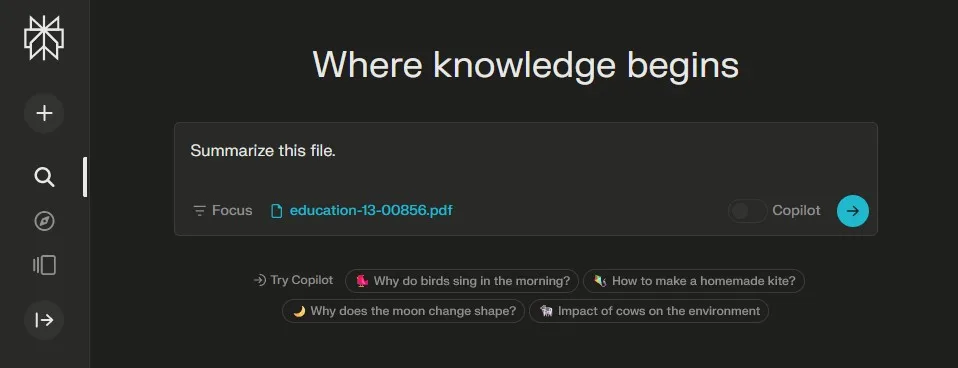AI tools to summarize stuff are taking over the world, making our lives easier and easier. But is this overdependence that we need to be careful about?
Everyone is talking about the ever-dwindling average attention span and the vices of short-form content, whether true or false. Nobody seems to be looking at AI summarizing everything from news articles penned by hard-working journalists to search results using tools that are replacing the art of meticulous research. Is everybody on board? Should we think twice before getting yet another form of AI-powered summaries in our lives?
I’m not going to discuss the problems of hallucination or inaccuracies here. All that has been normalized. Besides, these LLMs are only going to get better, making these cases rarer and rarer. What we should be concerned about is that AI is summarizing everything in our lives.
At this rate, generative AI will be an inseparable part that keeps us from going all the way (reading a full article, doing our own research, discovering the tone in an email, or finding the nuances in a document). Soon, we might also get summarized messages and calls.
This idea fits perfectly well with the mindset of the modern citizen. The modern citizen wants everything, all at once, as quickly as possible. The modern citizen doesn’t wish to sit through a meeting paying attention or forming social bonds, the modern citizen would rather have a summary of the meeting notes delivered for a quick glimpse.
Well, summaries do make our lives easier. The only question is where do we draw the line between convenience and overreliance?
Yelp released AI-powered business summaries1. Amazon added AI-generated review summaries so you can be saved from the trouble of reading through reviews last year2. Bloomberg launched its AI-powered earnings call summaries to let analysts draw connections quicker and do better business3. LinkedIn got on the gravy train and added AI-powered summaries for its articles4. Brave Browser launched its own Summarizer, a tool that makes searching easier on the web5. Microsoft’s AI summaries work across its Office 365 suite6. You can also auto-generate summaries in Google Docs7 because it’s challenging for many of us “to keep up with the volume of documents that arrive in our inboxes every day.” Shortwave is a fairly new email app that can summarize your emails for you8. And of course, Perplexity AI is a $520 million company with a single aim: to replace Google Search with AI-powered summaries and answers to your questions, what with Nvidia and Jeff Bezos being super serious about it.
This is a pattern.
AI-generated summaries are taking over the world, one tool and app at a time. The rudimentary way of copy-pasting links and text or uploading documents in a tool like ChatGPT or Perplexity to summarize is outdated already. Now, you have specialized features, standalone apps, and even browser extensions that use one of the leading LLMs to do the job for you.
I get it, taking notes is hard.
First, it was reading books and newspapers that became hard. Then, watching long-form videos and listening to episodic podcasts. It’s all hard now. We’d rather read AI-generated summaries of all news articles about the world’s many conflicts. Who cares if a journalist spent hours just fine-tuning the article? Our brains don’t like hard. And now, they don’t have to do hard.
This is the AI promise. They summarize everything. It’s possible for you to take a 300-page report on a complex issue and ask a tool to summarize all the key points in it. The better your prompt, the more value you can get out of this (such as summarize the key points relating to the process of conducting the research, list all the conclusions in bullet points, or summarize all cited sources).
Just one more step closer to relying on AI for everything.
Don’t get me wrong, in many situations, summaries are invaluably good. I don’t need to give you examples. We’ve all been through repetitive tasks. Now, we have personal assistants and intelligent tools that can scan through documents, large bodies of text, or entire websites in a split second to offer the essence of it all.
In the scientific realm, it’s having a truly significant impact already. AI can generate discharge summaries in healthcare that are superior9. Lecture videos can be made easier to digest with AI summaries10. Disaster events, when analyzed and summarized by AI, can offer insights humans missed11. But in our day-to-day life, or even when we’re not working? What then?
It’s just that we need to be a little careful. Overreliance on things that simplify our lives for the sake of simplification, not actual improvement, has never turned out to be a good idea.
1. https://blog.yelp.com/news/winter-product-release-2024/
2. https://www.theverge.com/2023/8/14/23831391/amazon-review-summaries-generative-ai
3. https://www.bloomberg.com/company/press/bloomberg-launches-ai-powered-earnings-call-summaries/
5. https://brave.com/ai-summarizer/
6. https://www.cryptopolitan.com/microsoft-introduces-ai-powered-document/
7. https://blog.research.google/2022/03/auto-generated-summaries-in-google-docs.html
8. https://techcrunch.com/2023/03/01/shortwave-email-app-introduces-ai-powered-summaries/
9. https://bjgpopen.org/content/early/2023/09/07/BJGPO.2023.0116.abstract
10. https://link.springer.com/article/10.1007/s10639-023-11866-7
11. https://www.tandfonline.com/doi/full/10.1080/0144929X.2019.1610908

